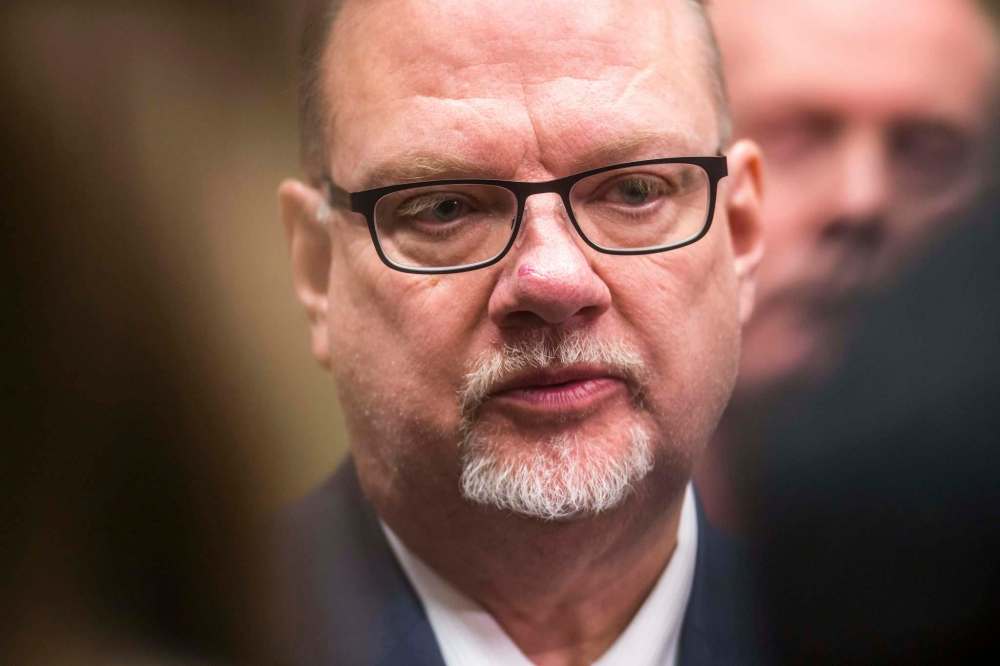Province orders school divisions to cut management
Read this article for free:
or
Already have an account? Log in here »
To continue reading, please subscribe:
Monthly Digital Subscription
$0 for the first 4 weeks*
- Enjoy unlimited reading on winnipegfreepress.com
- Read the E-Edition, our digital replica newspaper
- Access News Break, our award-winning app
- Play interactive puzzles
*No charge for 4 weeks then price increases to the regular rate of $19.00 plus GST every four weeks. Offer available to new and qualified returning subscribers only. Cancel any time.
Monthly Digital Subscription
$4.75/week*
- Enjoy unlimited reading on winnipegfreepress.com
- Read the E-Edition, our digital replica newspaper
- Access News Break, our award-winning app
- Play interactive puzzles
*Billed as $19 plus GST every four weeks. Cancel any time.
To continue reading, please subscribe:
Add Free Press access to your Brandon Sun subscription for only an additional
$1 for the first 4 weeks*
*Your next subscription payment will increase by $1.00 and you will be charged $16.99 plus GST for four weeks. After four weeks, your payment will increase to $23.99 plus GST every four weeks.
Read unlimited articles for free today:
or
Already have an account? Log in here »
Hey there, time traveller!
This article was published 30/01/2020 (2141 days ago), so information in it may no longer be current.
Public school divisions are being directed to freeze wages and reduce overall management positions by at least 15 per cent, as Manitoba continues to show spending restraint in the public education system.
The province made the announcements Thursday, in addition to releasing a breakdown of funding for divisions for the 2020-21 academic year.
For the third year in a row, public elementary and high schools will receive a $6.6-million boost in funding next year, totalling $1.33 billion — an approximately 0.5 per cent increase. The province has also again requested divisions limit education property tax increases to a maximum of two per cent.
Post-secondary management
Manitoba’s universities and colleges will soon have to comply with a provincial directive to streamline management.
The province announced Thursday it has asked post-secondary institutes to cut executive staff by 15 per cent and freeze remaining executives’ wages.
Manitoba’s universities and colleges will soon have to comply with a provincial directive to streamline management.
The province announced Thursday it has asked post-secondary institutes to cut executive staff by 15 per cent and freeze remaining executives’ wages.
Finance Minister Scott Fielding said in a release the province has renewed its focus on “flattening top-heavy management structures.”
The province said it will provide direction to schools to “clearly set and control compensation limits” and review management layers.
Following the announcement Thursday, Janet Morrill voiced the University of Manitoba Faculty Association’s firm opposition.
“When faced with tight budgets, it is not helpful to impose additional constraints on an organization, as they are not based on any understanding of that organization’s particular challenges, structure, past decisions and current situation,” Morrill said in an emailed statement to the Free Press.
The president of the faculty association added the institutional autonomy of universities is “even more important.”
“Universities have to be free from undue government influence to be able to fulfill their societal function.”
Spokespeople for the University of Winnipeg and Red River College declined to comment Thursday, citing a need to thoroughly review the announcements. The University of Manitoba did not immediately provide an interview ahead of publication.
— Maggie Macintosh
In a letter addressed to school division chairpersons, Education Minister Kelvin Goertzen cited the need for the public sector to manage costs and “stay within their mandates.”
He wrote there has been a three per cent decrease in the total students attending public schools over the last 20 years, while executive staff and per-person salaries have increased.
Goertzen told reporters Thursday divisions will be asked to review their layers of management and the ratios between managers and employees to determine where cuts can be made.
“The divisions can make choices as they feel is best to invest the money, but we’ve indicated it should go into the classrooms, go into the front lines — whether that’s to support teachers or those who are working in the system,” he said.
Superintendents, chief financial officers, secretary-treasurers, senior officers and director positions, among others, are in the scope of the staffing reductions.

Goertzen said reviews of “executive management” won’t go as far down as principals, but there’s a chance they could in the future.
The minister could not immediately provide a sum for how much divisions are expected to save by cutting those positions — although he said cuts will have to be made soon, to comply with the start of the 2020-21 fiscal year on April 1.
Divisions are also being handed down a directive to freeze executive staff wages for two years, cap an increase at 0.75 per cent the following year, and no more than one per cent the next. The compensation changes mirror those undertaken by the province itself.
“There are a lot of school divisions who will have difficult conversations ahead of them because, in a lot of places, administration is already very tight when it comes to providing adequate leadership to school principals and department heads and the like,” said Alan Campbell, president of the Manitoba School Boards Association.
Campbell noted, meantime, more than half of Manitoba’s school divisions will experience a reduction in total funding next year.
The province has promised all schools will receive at least 98 per cent of the funding in 2020-21 they received for this year. Enrolment mainly determines where the money goes.
Beautiful Plains has been handed the highest increase, at 6.4 per cent, while rural divisions such as the Interlake School Division were given a two per cent decrease.
While two per cent may not seem like a lot, Campbell said, it becomes “very, very tight” when boards’ expenses and utility costs increase — so much so, it becomes difficult to “insulate” classrooms from budget restraints.
“There are a lot of school divisions who will have difficult conversations ahead of them because, in a lot of places, administration is already very tight when it comes to providing adequate leadership to school principals and department heads and the like.” – Alan Campbell, president of the Manitoba School Boards Association
James Bedford of the Manitoba Teachers’ Society said Thursday teachers are already being challenged by larger class sizes and fewer supports in classrooms, particularly for students with special needs.
“There are no winners among school divisions. There’s just divisions that lose a little bit and there’s other divisions that lose a lot,” Bedford said.
In a scrum Thursday afternoon, New Democrat MLA Matt Wiebe told reporters: “It’s incredible frustrating that school divisions are being asked to do more with less.”
The MLA for Concordia called the $6.6-million public school funding increase a “de facto cut” for another consecutive year, since it doesn’t meet inflation.
Goertzen denied the claim, adding school divisions should look to reduce out-of-province travel expenses in order to redirect funds to the classroom.
On Thursday, the province made public a list detailing hundreds of thousands in executive staff travel expenses across all divisions between 2017 and 2019. It includes travel to international conferences and workshops as far off as Europe and Australia.
maggie.macintosh@freepress.mb.ca
Twitter: @macintoshmaggie
Funding for the Free Press education reporter comes from the Government of Canada through the Local Journalism Initiative.

Maggie Macintosh reports on education for the Winnipeg Free Press. Funding for the Free Press education reporter comes from the Government of Canada through the Local Journalism Initiative.
Our newsroom depends on a growing audience of readers to power our journalism. If you are not a paid reader, please consider becoming a subscriber.
Our newsroom depends on its audience of readers to power our journalism. Thank you for your support.
History
Updated on Thursday, January 30, 2020 7:03 PM CST: updates thumbnail
Updated on Friday, January 31, 2020 9:46 AM CST: Corrects per cent figure regarding increase











